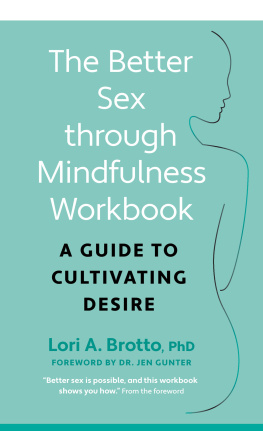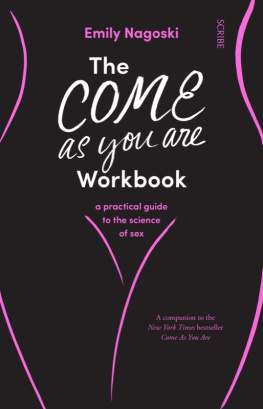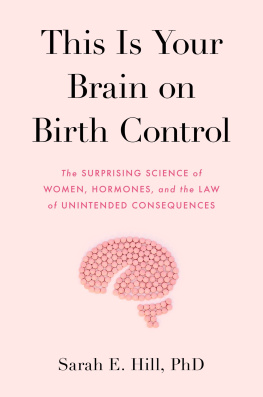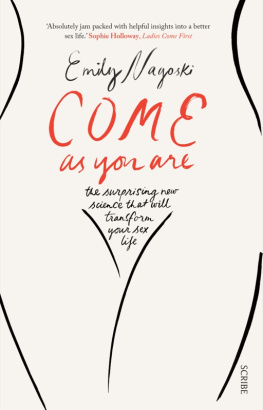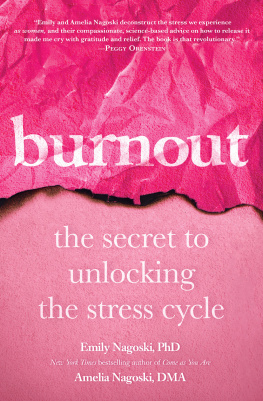Thank you for downloading this Simon & Schuster eBook.
Join our mailing list and get updates on new releases, deals, bonus content and other great books from Simon & Schuster.
C LICK H ERE T O S IGN U P
or visit us online to sign up at
eBookNews.SimonandSchuster.com
We hope you enjoyed reading this Simon & Schuster eBook.
Join our mailing list and get updates on new releases, deals, bonus content and other great books from Simon & Schuster.
C LICK H ERE T O S IGN U P
or visit us online to sign up at
eBookNews.SimonandSchuster.com

Simon & Schuster Paperbacks
A Division of Simon & Schuster, Inc.
1230 Avenue of the Americas
New York, NY 10020
www.SimonandSchuster.com
Copyright 2015 by Emily Nagoski, Ph.D.
All rights reserved, including the right to reproduce this book or portions thereof in any form whatsoever. For information address Simon & Schuster Paperbacks Subsidiary Rights Department, 1230 Avenue of the Americas, New York, NY 10020.
First Simon & Schuster trade paperback edition March 2015
SIMON & SCHUSTER PAPERBACKS and colophon are registered trademarks of Simon & Schuster, Inc.
For information about special discounts for bulk purchases, please contact Simon & Schuster Special Sales at 1-866-506-1949 or .
The Simon & Schuster Speakers Bureau can bring authors to your live event. For more information or to book an event contact the Simon & Schuster Speakers Bureau at 1-866-248-3049 or visit our website at www.simonspeakers.com.
Illustrated by Erika Moen
Interior design by Ruth Lee-Mui
Cover design by Gail Anderson and Joe Newton
Cover photograph by Isabella Selby
Library of Congress Cataloging-in-Publication
Data Nagoski, Emily.
Come as you are : the surprising new science that will transform your sex life / Emily Nagoski, Ph.D.
pages cm
Includes bibliographical references.
1. Sex instruction for women. 2. Sexual health. 3. WomenSexual behavior. 4. WomenHealth and hygiene. I. Title.
HQ46.N32 2015
613.9'54dc23
2014017773
ISBN 978-1-4767-6209-8
ISBN 978-1-4767-6211-1 (ebook)
For my students
contents
introduction
YES, YOU ARE NORMAL
To be a sex educator is to be asked questions. Ive stood in college dining halls with a plate of food in my hands answering questions about orgasm. Ive been stopped in hotel lobbies at professional conferences to answer questions about vibrators. Ive sat on a park bench, checking social media on my phone, only to find questions from a stranger about her asymmetrical genitals. Ive gotten emails from students, from friends, from their friends, from total strangers about sexual desire, sexual arousal, sexual pleasure, sexual pain, orgasm, fetishes, fantasies, bodily fluids, and more.
Questions like...
Once my partner initiates, Im into it, but it seems like it never even occurs to me to be the one to start things. Why is that?
My boyfriend was like, Youre not ready, youre still dry. But I was so ready. So why wasnt I wet?
I saw this thing about women who cant enjoy sex because they worry about their bodies the whole time. Thats me. How do I stop doing that?
I read something about women who stop wanting sex after a while in a relationship, even if they still love their partner. Thats me. How do I start wanting sex with my partner again?
I think maybe I peed when I had an orgasm... ?
I think maybe Ive never had an orgasm... ?
Under all these questions, theres really just one question:
Am I normal?
(The answer is nearly always: Yes.)
This book is a collection of answers. Theyre answers that Ive seen change womens lives, answers informed by the most current science and by the personal stories of women whose growing understanding of sex has transformed their relationships with their own bodies. These women are my heroines, and I hope that by telling their stories, Ill empower you to follow your own path, to reach for and achieve your own profound and unique sexual potential.
the true story of sex
After all the books that have been written about sex, all the blogs and TV shows and radio Q&As, how can it be that we all still have so many questions?
Well. The frustrating reality is weve been lied tonot deliberately, its no ones fault, but still. We were told the wrong story.
For a long, long time in Western science and medicine, womens sexuality was viewed as Mens Sexuality Litebasically the same but not quite as good.
For instance, it was just sort of assumed that since men have orgasms during penis-in-vagina sex (intercourse), women should have orgasms with intercourse too, and if they dont, its because theyre broken.
In reality, about 30 percent of women orgasm reliably with intercourse. The other 70 percent sometimes, rarely, or never orgasm with intercourse, and theyre all healthy and normal. A woman might orgasm lots of other waysmanual sex, oral sex, vibrators, breast stimulation, toe sucking, pretty much any way you can imagineand still not orgasm during intercourse. Thats normal.
It was just assumed, too, that because a mans genitals typically behave the way his mind is behavingif his penis is erect, hes feeling turned ona womans genitals should also match her emotional experience.
And again, some womens do, many dont. A woman can be perfectly normal and healthy and experience arousal nonconcordance, where the behavior of her genitals (being wet or dry) may not match her mental experience (feeling turned on or not).
And it was also assumed that because men experience spontaneous, out-of-the-blue desire for sex, women should also want sex spontaneously.
Again it turns out thats true sometimes, but not necessarily. A woman can be perfectly normal and healthy and never experience spontaneous sexual desire. Instead, she may experience responsive desire, in which her desire emerges only in a highly erotic context.
In reality, women and men are different.
But wait. Women and men both experience orgasm, desire, and arousal, and men, too, can experience responsive desire, arousal nonconcordance, and lack of orgasm with penetration. Women and men both can fall in love, fantasize, masturbate, feel puzzled about sex, and experience ecstatic pleasure. They both can ooze fluids, travel forbidden paths of sexual imagination, encounter the unexpected and startling ways that sex shows up in every domain of lifeand confront the unexpected and startling ways that sex sometimes declines, politely or otherwise, to show up.
So... are women and men really that different?
The problem here is that weve been taught to think about sex in terms of behavior, rather than in terms of the biological, psychological, and social processes underlying the behavior. We think about our physiological behaviorblood flow and genital secretions and heart rate. We think about our social behaviorwhat we do in bed, whom we do it with, and how often. A lot of books about sex focus on those things; they tell you how many times per week the average couple has sex or they offer instructions on how to have an orgasm, and they can be helpful.
But if you really want to understand human sexuality, behavior alone wont get you there. Trying to understand sex by looking at behavior is like trying to understand love by looking at a couples wedding portrait... and their divorce papers. Being able to describe what happenedtwo people got married and then got divorceddoesnt get us very far. What we want to know is why and how it came to be. Did our couple fall out of love after they got married, and thats why they divorced? Or were they never in love but were forced to marry, and finally became free when they divorced? Without better evidence, were mostly guessing.
Next page

